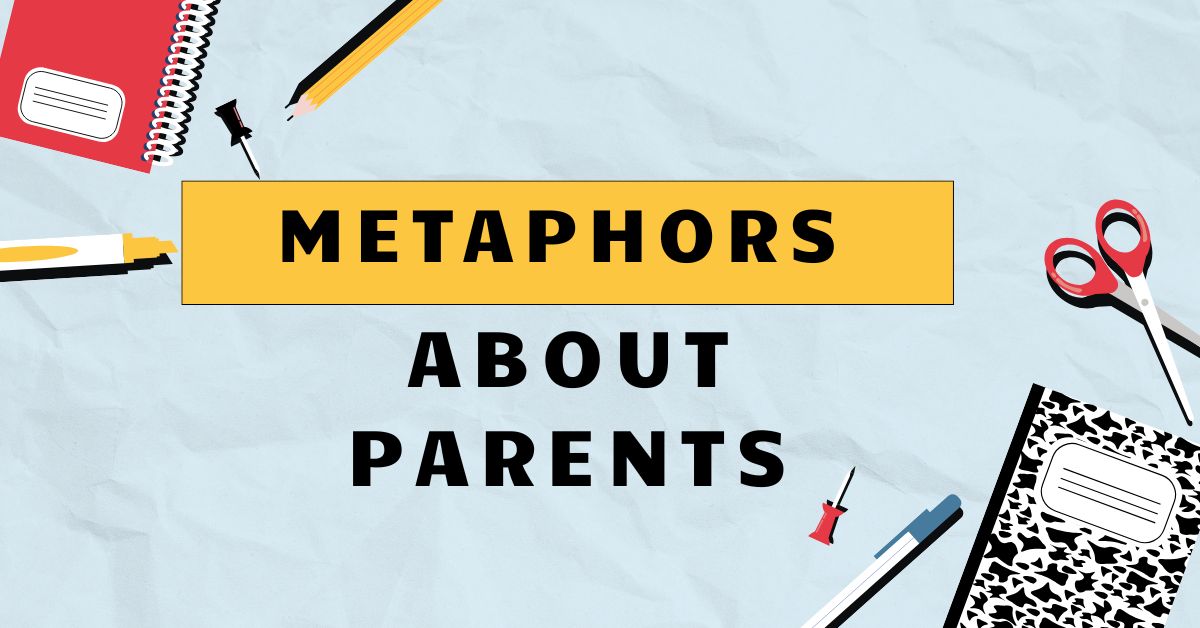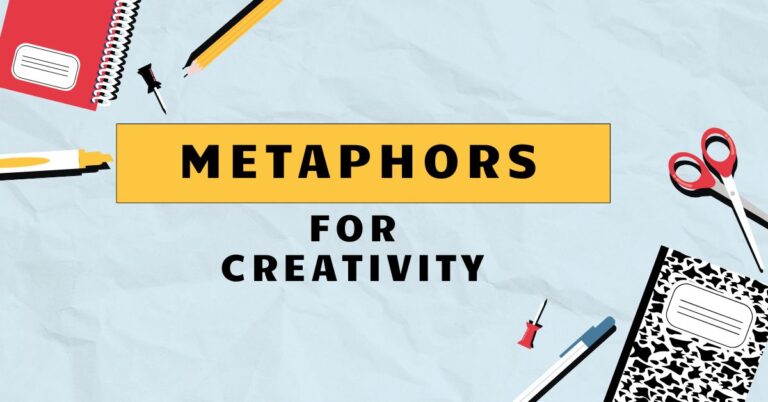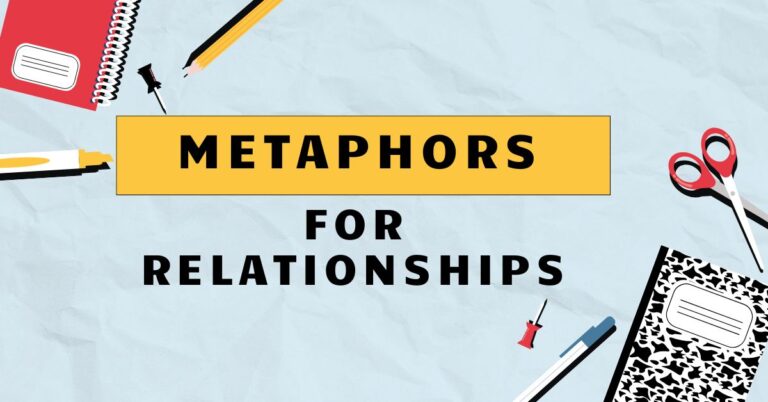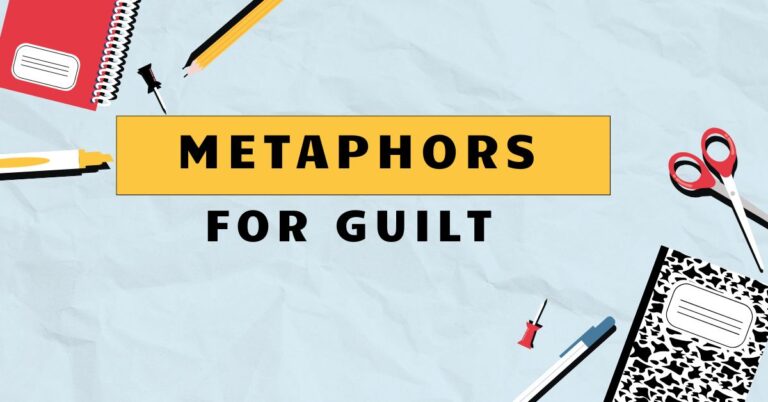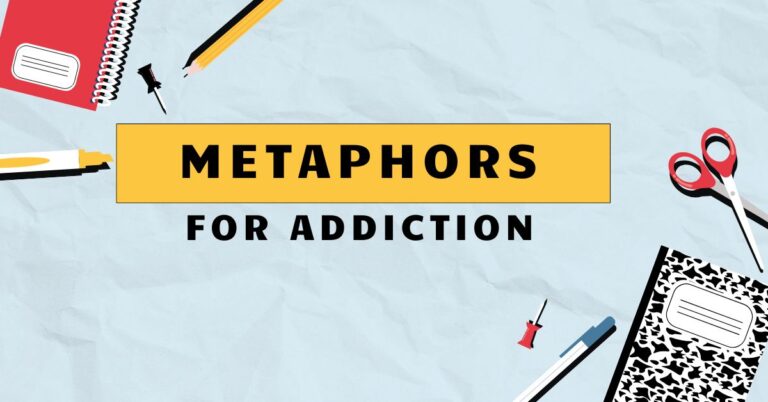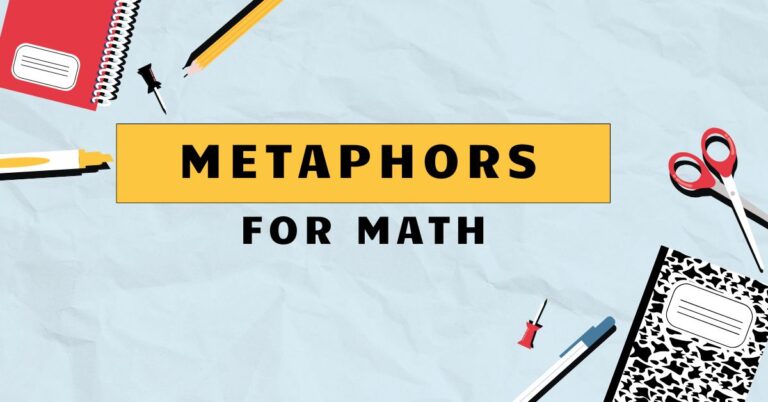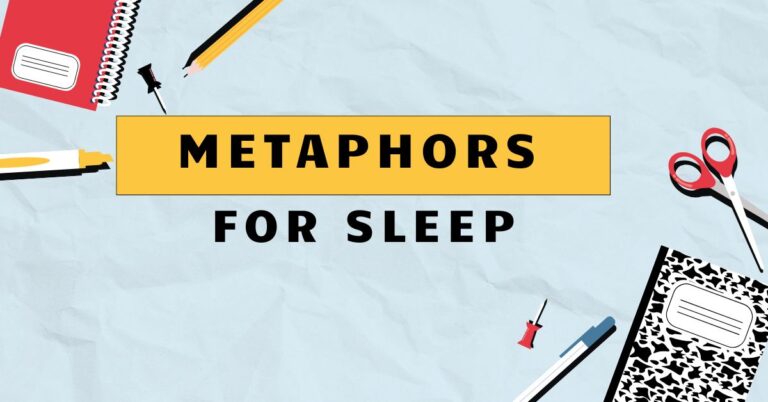42 Metaphors About Parents: Understanding Figurative Language
Metaphors are powerful tools in language, allowing us to understand abstract concepts by comparing them to something more concrete. When it comes to describing parents, metaphors can be particularly evocative, capturing complex emotions and relationships in a single, vivid image.
Understanding these metaphors enhances our comprehension of literature, everyday conversations, and even our own feelings about family. This article explores the world of metaphors about parents, providing definitions, examples, and exercises to help you master this essential aspect of figurative language.
Whether you’re a student, writer, or simply someone interested in language, this guide will deepen your understanding and appreciation of the art of metaphorical expression.
Table of Contents
- Introduction
- Definition of Metaphor
- Structural Breakdown
- Types of Metaphors About Parents
- Nurturing Metaphors
- Protective Metaphors
- Guiding Metaphors
- Challenging Metaphors
- Foundational Metaphors
- Examples of Metaphors About Parents
- Nurturing Metaphors Examples
- Protective Metaphors Examples
- Guiding Metaphors Examples
- Challenging Metaphors Examples
- Foundational Metaphors Examples
- Usage Rules
- Common Mistakes
- Practice Exercises
- Advanced Topics
- FAQ
- Conclusion
Definition of Metaphor
What is a Metaphor?
A metaphor is a figure of speech that directly compares two unrelated things without using “like” or “as.” It asserts that one thing *is* another, creating a vivid and often surprising connection in the reader’s or listener’s mind. Unlike similes, which use explicit comparison words, metaphors imply the comparison, making them more impactful and thought-provoking.
The power of a metaphor lies in its ability to transfer qualities from one concept to another, offering new insights and perspectives.
Classification of Metaphors
Metaphors can be classified in various ways, including:
- Standard Metaphors: These are commonly used and easily understood metaphors (e.g., “time is money”).
- Novel Metaphors: These are original and creative metaphors that offer a fresh perspective (e.g., “the city is a symphony of honking horns”).
- Dead Metaphors: These are metaphors that have become so ingrained in everyday language that we no longer recognize them as metaphors (e.g., “the leg of a table”).
- Mixed Metaphors: These are metaphors that combine different, often incompatible, images (e.g., “we need to nip it in the bud to put the fire out”). These are generally considered poor writing style.
Understanding these classifications helps in analyzing the effectiveness and originality of different metaphorical expressions.
Function of Metaphors
Metaphors serve several important functions in language and communication:
- Explanation: They can simplify complex ideas by relating them to familiar concepts.
- Emphasis: They can highlight particular qualities or aspects of a subject.
- Emotional Impact: They can evoke strong emotions and create a more engaging experience for the audience.
- Creativity: They add richness and originality to writing and speech.
Effective metaphors enhance understanding and create a lasting impression.
Context of Metaphors
The meaning and impact of a metaphor can vary depending on the context in which it is used. Cultural background, personal experiences, and the surrounding text all play a role in how a metaphor is interpreted.
For example, a metaphor about a “lion” might evoke different images and emotions depending on whether the audience associates lions with courage, power, or danger. Therefore, it’s crucial to consider the context when analyzing and using metaphors.
Structural Breakdown
A metaphor essentially consists of two parts: thetenorand thevehicle. The tenor is the subject being described (e.g., a parent), and the vehicle is the object or concept used to describe the tenor (e.g., a rock, a lighthouse).
The connection between the tenor and the vehicle is what creates the metaphorical meaning. Understanding this structure allows for a deeper appreciation of the metaphor’s construction and intended effect.
The relationship between the tenor and vehicle can be direct or implied, leading to different levels of metaphorical complexity.
Metaphors rely on shared characteristics between the tenor and the vehicle to create meaning. These shared characteristics, orground, form the basis of the comparison.
The stronger the connection and the more relevant the shared characteristics, the more effective the metaphor will be. Consider the metaphor “My mother is a fortress.” Here, the tenor is “mother,” the vehicle is “fortress,” and the shared characteristics (the ground) might include strength, protection, and resilience.
Types of Metaphors About Parents
Metaphors used to describe parents often fall into several categories, reflecting the various roles and responsibilities that parents fulfill.
Nurturing Metaphors
These metaphors emphasize the caring and supportive qualities of parents. They often compare parents to things that provide nourishment, comfort, and growth.
Examples include comparing a mother to a “garden” or a father to “sunshine.” Such metaphors highlight the parent’s role in fostering the child’s development and well-being. They emphasize the love, care, and attention that parents provide to help their children thrive.
Protective Metaphors
These metaphors highlight the parent’s role in safeguarding their children from harm. They often compare parents to strong, resilient objects or figures, such as a “shield,” a “wall,” or a “lioness.” These metaphors convey the parent’s unwavering commitment to their child’s safety and security.
They illustrate the lengths to which parents will go to protect their children from physical and emotional threats.
Guiding Metaphors
These metaphors emphasize the parent’s role in providing direction and wisdom. They often compare parents to navigational tools or figures, such as a “compass,” a “lighthouse,” or a “map.” These metaphors suggest that parents help their children navigate the challenges of life and find their way in the world.
They highlight the parent’s ability to provide insight, advice, and support to help their children make informed decisions.
Challenging Metaphors
These metaphors acknowledge the difficulties and complexities of parenting. They may compare parents to “tightrope walkers,” “jugglers,” or “generals in a war.” These metaphors reflect the constant demands, sacrifices, and emotional toll that parenting can entail.
They offer a more realistic and nuanced portrayal of the parental experience, acknowledging the struggles and uncertainties involved.
Foundational Metaphors
These metaphors highlight the fundamental role parents play in shaping their children’s identities and values. They often compare parents to “cornerstones,” “roots,” or “architects.” These metaphors emphasize the lasting impact that parents have on their children’s lives, laying the groundwork for their future success and happiness.
They suggest that parents provide the essential building blocks for their children’s character and worldview.
Examples of Metaphors About Parents
The following sections provide extensive examples of metaphors about parents, organized by category.
Nurturing Metaphors Examples
These examples illustrate how parents can be metaphorically described as sources of nourishment, comfort, and growth.
| Metaphor | Explanation |
|---|---|
| My mother is a warm blanket on a cold night. | The mother provides comfort and security. |
| My father is the sunshine that helps me grow. | The father provides encouragement and support for personal development. |
| Her love is a gentle rain, nourishing my soul. | Her love is essential and revitalizing. |
| My parents are the roots that ground me. | The parents provide stability and a sense of belonging. |
| She is the garden where my dreams blossom. | She creates an environment where dreams can flourish. |
| He is the chef who crafts my potential. | He skillfully shapes and cultivates potential. |
| My mom is the nest where I always find comfort. | The mother provides a safe and comforting space. |
| My dad is the fertile soil that helps my ambitions sprout. | The father provides the resources and support for ambitions to grow. |
| She’s the lullaby that soothes my anxieties. | She provides comfort and reduces anxiety. |
| He’s the hearth that warms our family. | He is the center of warmth and comfort in the family. |
| My mother is a fountain of endless love. | The mother’s love is abundant and never-ending. |
| My father is a sturdy tree, providing shade and support. | The father offers protection and stability. |
| She’s the gentle breeze that guides my path. | She provides guidance and direction in a subtle way. |
| He’s the comforting fire on a cold day. | He offers warmth and solace in times of need. |
| My mother is the gentle stream that nourishes my spirit. | The mother provides a constant source of spiritual nourishment. |
| My father is the strong oak that shelters me from the storm. | The father offers protection and security during difficult times. |
| She’s the soft pillow where I rest my weary head. | She provides comfort and relaxation. |
| He’s the steady hand that guides me through life. | He provides guidance and support with a firm and reliable approach. |
| My mother is the gentle rain that helps my dreams grow. | The mother’s care and support foster the growth of aspirations. |
| My father is the rich soil where my potential takes root. | The father provides the foundation for personal development. |
| She’s the cozy blanket that wraps me in love. | She provides warmth and affection. |
| He’s the guiding star that leads me home. | He provides direction and a sense of belonging. |
| My mother is the soothing balm that heals my wounds. | The mother provides comfort and healing during difficult times. |
| My father is the sturdy bridge that carries me over obstacles. | The father helps overcome challenges and difficulties. |
Protective Metaphors Examples
These examples illustrate how parents can be metaphorically described as protectors and guardians.
| Metaphor | Explanation |
|---|---|
| My father is a shield against the world’s harshness. | The father protects from external negativity. |
| My mother is a fortress, keeping me safe from harm. | The mother provides a secure and protected environment. |
| He is the wall that stands between me and danger. | He protects from potential threats and harm. |
| She’s the guardian angel watching over me. | She provides constant protection and guidance. |
| My parents are the bodyguards of my heart. | The parents protect emotional well-being. |
| He’s the sentinel, always on watch for my safety. | He remains vigilant to ensure safety. |
| She is the lioness defending her cubs. | She fiercely protects her children. |
| My dad is the sturdy fence that keeps out the wolves. | The father protects the family from external threats. |
| She’s the umbrella that shields me from the storm. | She provides protection during difficult times. |
| He’s the knight in shining armor, always ready to defend me. | He is always prepared to protect and rescue. |
| My mother is a lighthouse, guiding me away from dangerous shores. | The mother provides guidance and protection, keeping one safe from harm. |
| My father is the rock, unyielding in the face of adversity. | The father is strong and steadfast, providing stability in challenging times. |
| She’s the iron gate that keeps out the darkness. | She provides a strong barrier against negativity and despair. |
| He’s the watchful owl, always alert to potential dangers. | He is vigilant and observant, ensuring safety and security. |
| My mother is the vigilant hawk, soaring high above, always watching over her young. | The mother is ever-watchful and protective of her children, ensuring their safety and well-being. |
| My father is the solid dam that holds back the floodwaters of life’s challenges. | The father provides strength and resilience, helping to weather life’s difficulties. |
| She’s the unbreakable chain that binds our family together, protecting us from harm. | She is the strong and enduring force that keeps the family united and safe. |
| He’s the fearless warrior, always ready to battle for my happiness and well-being. | He is courageous and determined, fighting for the welfare and joy of his children. |
| My mother is the protective shell, shielding me from the harsh realities of the world. | The mother provides a safe and nurturing environment, buffering her children from life’s difficulties. |
| My father is the unwavering anchor, keeping me grounded amidst life’s turbulent storms. | The father provides stability and security, helping to navigate through challenging times. |
| She’s the vigilant sentinel, guarding my dreams and aspirations from doubt and discouragement. | She is watchful and supportive, protecting dreams and aspirations from negativity. |
| He’s the stalwart defender, standing firm against any threat to my peace and happiness. | He is resolute and unwavering, safeguarding peace and happiness from harm. |
| My mother is the resilient wall, weathering every storm, ensuring our safety within. | The mother provides enduring strength and protection, ensuring the family’s well-being. |
| My father is the steadfast lighthouse, guiding me safely through the darkest nights. | The father provides guidance and direction, ensuring safety and security in times of uncertainty. |
Guiding Metaphors Examples
These examples illustrate how parents can be metaphorically described as guides and mentors.
| Metaphor | Explanation |
|---|---|
| My mother is a compass, always pointing me in the right direction. | The mother provides clear guidance and direction. |
| My father is a map, helping me navigate life’s challenges. | The father offers a plan or strategy for overcoming obstacles. |
| She’s the lighthouse that guides me through stormy seas. | She provides guidance and safety during difficult times. |
| He’s the mentor who shows me the path to success. | He provides guidance and support for achieving goals. |
| My parents are the signposts on my journey. | The parents offer direction and clarity along the way. |
| She is the north star guiding me home. | She provides a constant source of direction and comfort. |
| He is the wise old owl, offering insights and advice. | He provides valuable wisdom and guidance. |
| My mother is the experienced navigator, charting the course for my future. | The mother provides guidance and direction for the future. |
| My father is the seasoned explorer, leading me through uncharted territories. | The father guides through unfamiliar and challenging experiences. |
| She’s the patient teacher, imparting wisdom and knowledge. | She provides patient guidance and instruction. |
| He’s the trusted advisor, offering counsel and support. | He provides reliable advice and assistance. |
| My mother is the guiding hand that steers me clear of pitfalls. | The mother provides gentle direction to avoid mistakes. |
| My father is the steady voice that whispers encouragement in my ear. | The father offers constant support and motivation. |
| She’s the gentle whisper that guides me away from temptation. | She provides subtle guidance to make the right choices. |
| He’s the shining beacon, illuminating the path to my dreams. | He provides inspiration and direction towards achieving goals. |
| My mother is the wise sage, sharing her life lessons with me. | The mother imparts valuable knowledge and experience. |
| My father is the seasoned captain, navigating the ship of my life with skill and expertise. | The father provides expert guidance and direction through life’s journey. |
| She’s the insightful seer, foreseeing the challenges ahead and preparing me for them. | She provides foresight and prepares for future difficulties. |
| He’s the trusted confidant, offering solace and guidance in times of need. | He provides comfort and direction during challenging times. |
| My mother is the gentle breeze that steers my sails towards my true north. | The mother provides subtle guidance towards personal fulfillment. |
| My father is the steadfast rudder that keeps me on course, even when the winds are strong. | The father provides unwavering direction, ensuring stability and purpose. |
| She’s the patient scribe, helping me write the story of my life with courage and authenticity. | She provides support and encouragement to live life authentically. |
| He’s the guiding star, leading me towards my destiny with unwavering brilliance. | He provides inspiration and direction towards fulfilling one’s potential. |
| My mother is the seasoned cartographer, mapping out the possibilities that lie before me. | The mother provides insight and direction towards future opportunities. |
| My father is the trusted navigator, helping me chart a course that aligns with my values and aspirations. | The father provides guidance in aligning life choices with personal values and goals. |
Challenging Metaphors Examples
These examples illustrate the difficulties and complexities of parenting.
| Metaphor | Explanation |
|---|---|
| Parenting is a tightrope walk, balancing love and discipline. | Parenting requires careful balance and precision. |
| Raising children is like juggling knives, one mistake and someone gets hurt. | Parenting is a risky and demanding endeavor. |
| Being a parent is like being a general in a war, constantly battling for your child’s well-being. | Parenting involves constant struggles and challenges. |
| She’s a marathon runner, enduring the long race of parenthood. | She demonstrates endurance and perseverance in parenting. |
| He’s a sculptor, meticulously shaping his child’s character. | He carefully molds and develops his child’s personality. |
| My parents are the gardeners, constantly weeding out the bad influences. | The parents work to eliminate negative influences. |
| She’s the architect, building her child’s future brick by brick. | She carefully constructs the foundation for her child’s future. |
| He’s the firefighter, constantly putting out the flames of teenage rebellion. | He manages and resolves conflicts and challenges. |
| My parents are the detectives, always trying to uncover the truth behind teenage behavior. | The parents investigate and understand their child’s actions. |
| She’s the negotiator, constantly seeking compromise and resolution. | She facilitates communication and finds common ground. |
| He’s the referee, maintaining order and fairness in the family. | He ensures fairness and resolves conflicts within the family. |
| My mother is the relentless storm, both destructive and life-giving in her intensity. | The mother’s influence can be both challenging and transformative. |
| My father is the unforgiving mountain, imposing and impossible to scale. | The father can be perceived as distant and unapproachable. |
| She’s the tangled web, ensnaring her children in her own unresolved issues. | She may unintentionally involve her children in her personal struggles. |
| He’s the silent volcano, simmering with unspoken anger and resentment. | He may suppress emotions, leading to potential explosions. |
| My mother is the relentless taskmaster, driving her children to achieve at any cost. | The mother may prioritize achievement over well-being. |
| My father is the distant star, admired but unreachable and ultimately disconnected. | The father may be emotionally unavailable or distant. |
| She’s the fractured mirror, reflecting her own insecurities onto her children. | She may project her own anxieties and self-doubt onto her children. |
| He’s the unyielding wall, resistant to change and unwilling to compromise. | He may be inflexible and unwilling to adapt to changing circumstances. |
| My mother is the suffocating blanket, smothering her children with excessive control. | The mother may be overprotective and restrict her children’s autonomy. |
| My father is the absent conductor, leaving his family without guidance or direction. | The father may be uninvolved and neglectful. |
| She’s the unpredictable whirlwind, leaving chaos and confusion in her wake. | She may be erratic and create instability within the family. |
| He’s the broken record, repeating the same mistakes and patterns of behavior. | He may perpetuate harmful cycles and patterns. |
| My mother is the tightrope walker, desperately trying to maintain her balance while her children add weight to the rope. | The mother struggles to maintain equilibrium amidst the demands of motherhood. |
| My father is the caged lion, pacing restlessly within the confines of his responsibilities. | The father feels trapped and stifled by the constraints of his role. |
Foundational Metaphors Examples
These examples illustrate the fundamental role parents play in shaping their children’s identities and values.
| Metaphor | Explanation |
|---|---|
| My parents are the cornerstones of my life. | The parents provide a strong and essential foundation. |
| My mother is the bedrock upon which my values are built. | The mother provides a solid foundation for moral principles. |
| My father is the architect of my character. | The father shapes and designs personality. |
| They are the roots that nourish my soul. | They provide essential nourishment for spiritual growth. |
| My parents are the canvas upon which my life is painted. | The parents provide the background for life’s experiences. |
| She is the seed from which I grew. | She is the origin of my existence and development. |
| He is the potter who molded me. | He shaped and formed my character. |
| My mother is the foundation upon which my dreams are built. | The mother provides the strength and stability to pursue aspirations. |
| My father is the framework that supports my ambitions. | The father provides the structure for achieving goals. |
| They are the pillars that hold up my world. | They provide unwavering support and stability. |
| My mother is the silent sculptor, molding my spirit with gentle hands. | The mother subtly shapes and refines her child’s character. |
| My father is the patient gardener, tending to the seeds of my potential with care. | The father nurtures and cultivates his child’s abilities and talents. |
| They are the guiding stars, illuminating the path to my true self. | They provide direction and inspiration towards self-discovery. |
| My mother is the ancient tree, its roots entwined with mine, grounding me in wisdom and tradition. | The mother connects her child to their heritage and values. |
| My father is the solid rock, weathering the storms of life, teaching me resilience and strength. | The father demonstrates perseverance and fortitude in the face of adversity. |
| They are the steady anchors, preventing me from drifting aimlessly on the sea of life. | They provide stability and purpose, preventing aimlessness and uncertainty. |
| My mother is the invisible thread, weaving her love and guidance into the fabric of my being. | The mother’s influence is subtle yet profound, shaping her child’s identity. |
| My father is the steadfast compass, always pointing me towards my true north, even when I lose my way. | The father provides unwavering direction and purpose, guiding his child towards their authentic self. |
| They are the timeless melodies, echoing in my heart, reminding me of the values and lessons they have instilled. | They have instilled values and lessons that resonate deeply throughout life. |
| My mother is the gentle rain, nourishing the seeds of my dreams and helping them to blossom. | The mother provides the care and support needed for aspirations to flourish. |
| My father is the sturdy scaffolding, providing the support I need to reach new heights and achieve my goals. | The father provides the necessary support and structure for achieving ambitions. |
| They are the unwavering torches, illuminating the darkness, guiding me towards the light of knowledge and understanding. | They provide enlightenment and guidance, leading towards wisdom and comprehension. |
| My mother is the ancient scroll, containing the wisdom and stories of generations, passed down through her loving hands. | The mother shares valuable knowledge and heritage with her child. |
| My father is the solid bridge, connecting me to the past, present, and future, ensuring that I never lose sight of where I came from. | The father provides a connection to history, tradition, and future possibilities. |
Usage Rules
When using metaphors about parents, consider the following rules:
- Clarity: Ensure the comparison is clear and easily understood. Avoid overly obscure or complex metaphors.
- Relevance: Choose metaphors that are relevant to the qualities or aspects you want to emphasize.
- Originality: Strive for originality to make your writing more engaging and memorable. Avoid clichés and overused metaphors.
- Consistency: Maintain consistency in your metaphorical language throughout your writing. Avoid mixing metaphors that create conflicting images.
- Appropriateness: Consider the context and audience when choosing metaphors. Ensure that your metaphors are appropriate for the tone and purpose of your writing.
It is important to remember that while metaphors can be powerful, they should not be forced. If a metaphor feels unnatural or contrived, it is better to avoid it.
The best metaphors arise organically from the subject matter and enhance the overall meaning of the text.
Common Mistakes
Here are some common mistakes to avoid when using metaphors about parents:
| Incorrect | Correct | Explanation |
|---|---|---|
| My mother is a rock and a gentle breeze. | My mother is a rock in times of trouble. | Avoid mixing incompatible metaphors. |
| My father is the sun, shining down with icy rays. | My father is the sun, providing warmth and light. | Ensure the metaphor aligns with the intended meaning. |
| My parents are like a compass. | My parents are a compass, guiding my way. | Use metaphors directly instead of similes when you want to imply a stronger connection. |
Mixing metaphors can lead to confusion and weaken the impact of your writing. Choose metaphors that are consistent and create a clear and coherent image.
Practice Exercises
Test your understanding of metaphors about parents with these exercises.
Exercise 1: Identifying Metaphors
Identify the metaphors in the following sentences.
| Question | Answer |
|---|---|
| 1. My mother is an anchor, keeping me grounded. | Anchor |
| 2. My father is a sturdy bridge, helping me cross obstacles. | Bridge |
| 3. She is the lighthouse that guides me home. | Lighthouse |
| 4. He is the shield protecting me from harm. | Shield |
| 5. My parents are the roots that nourish my soul. | Roots |
| 6. She is the map to my future. | Map |
| 7. He is the potter molding my character. | Potter |
| 8. My mother is a fountain of love. | Fountain |
| 9. My father is a rock, unyielding in the face of adversity. | Rock |
| 10. She is the fortress protecting me from the world. | Fortress |
Exercise 2: Creating Metaphors
Create metaphors to describe the following aspects of parents:
| Aspect | Example Metaphor |
|---|---|
| A parent’s love | A warm fire on a cold day. |
| A parent’s guidance | A compass pointing north. |
| A parent’s protection | A sturdy shield in battle. |
| A parent’s support | A strong foundation for a building. |
| A parent’s wisdom | An ancient, well-loved book. |
Exercise 3: Analyzing Metaphors
Analyze the following metaphor:
What are the tenor, vehicle, and ground of this metaphor?
- Tenor: Mother
- Vehicle: Garden
- Ground: Provides nourishment, supports growth, fosters development
Advanced Topics
For a deeper understanding of metaphors about parents, consider exploring these advanced topics:
- Cultural Variations: How do metaphors about parents differ across cultures?
- Psychological Impact: How do metaphors about parents influence our perceptions and relationships?
- Literary Analysis: How are metaphors about parents used in literature to convey complex themes and emotions?
- Personal Metaphors: How can creating personal metaphors about your own parents enhance self-awareness and understanding?
By delving into these advanced topics, you can gain a more nuanced and comprehensive understanding of the power and significance of metaphors about parents.
FAQ
Conclusion
Metaphors about parents are powerful tools for expressing complex emotions and relationships. By understanding the different types of metaphors, their structural components, and the rules for using them effectively, you can enhance your appreciation of literature, improve your communication skills, and gain deeper insights into the human experience.
Whether you are a student, writer, or simply someone interested in language, mastering the art of metaphorical expression will enrich your understanding of the world around you. Embrace the creativity and insight that metaphors offer, and you will discover new ways to connect with others and express your own unique perspective.

